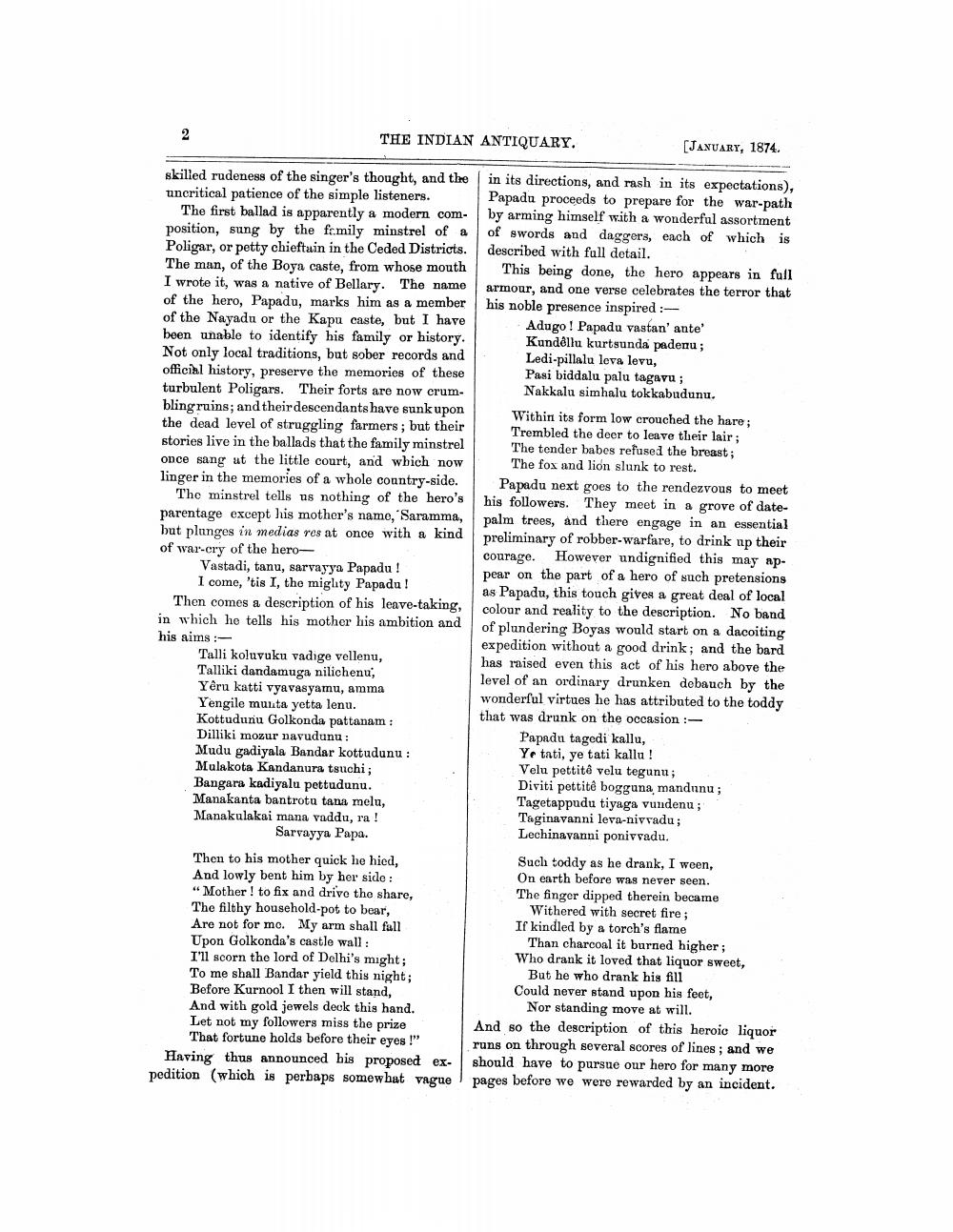________________
THE INDIAN ANTIQUARY.
[JANUARY, 1874.
skilled rudeness of the singer's thought, and the in its directions, and rash in its expectations), uncritical patience of the simple listeners. Papadu proceeds to prepare for the war-path
The first ballad is apparently a modern com- by arming himself with a wonderful assortment position, sung by the family minstrel of a of swords and daggers, each of which is Poligar, or petty chieftain in the Ceded Districts. described with full detail. The man, of the Boya caste, from whose mouth This being done, the hero appears in full I wrote it, was a native of Bellary. The name armour, and one verse celebrates the terror that of the hero, Papadu, marks him as a member his noble presence inspired :of the Nayadu or the Kapu caste, but I have
Adugo ! Papadu vastan' ante' been unable to identify his family or history. Kundêllu kurtsunda padenu; Not only local traditions, but sober records and
Ledi-pillalu leva levu, official history, preserve the memories of these
Pasi biddalu palu tagavu; turbulent Poligars. Their forts are now crum.
Nakkalu simhalu tokkabudunu. blingruins; and their descendants have sunk upon
Within its form low crouched the hare; the dead level of struggling farmers; but their
Trembled the deer to leave their lair; stories live in the ballads that the family minstrel The tender babes refused the breast; once sang ut the little court, and which now The fox and lion slunk to rest. linger in the memories of a whole country-side. Papadu next goes to the rendezvous to meet
The minstrel tells us nothing of the hero's his followers. They meet in a grove of dateparentage except his mother's namo, 'Saramma, palm trees, and there engage in an essential but plunges in medias res at once with a kind
preliminary of robber-warfare, to drink up their of war-cry of the hero
courage. However undignified this may apVastadi, tanu, sarvayya Papadu !
pear on the part of a hero of such pretensions I come, 'tis I, the mighty Papadu!
as Papadu, this touch gives a great deal of local Then comes a description of his leave-taking,
colour and reality to the description. No band in which he tells his mother his ambition and
of plundering Boyas would start on a dacoiting his aims :
expedition without a good drink; and the bard Talli koluvuku vadige vellenu,
has raised even this act of his hero above the Talliki dandamuga nilichenu,
level of an ordinary drunken debauch by the Yêru katti vyavasyamu, amma
wonderful virtues he has attributed to the toddy Yengile muuta yetta lenu. Kottudunu Golkonda pattanam :
that was drunk on the occasion :Dilliki mozur navudunu :
Papadu tagedi kallu, Mudu gadiyala Bandar kottudunu :
Ye tati, ye tati kallu ! Mulakota Kandanura tsuchi;
Velu pettitê velu tegunu; Bangara kadiyalu pettudunu.
Diviti pettitê bogguna mandunu; Manakanta bantrotu tana melu,
Tagetappudu tiyaga vundenu; Manakulakai mana vaddu, ra !
Taginavanni leva-nivvadu; Sarvayya Papa.
Lechinavanni ponivradu. Then to his mother quick he hied,
Such toddy as he drank, I ween, And lowly bent him by her side:
On earth before was never seen. "Mother! to fix and drive the share,
The finger dipped therein became The filthy household-pot to bear,
Withered with secret fire; Are not for me. My arm shall fall
If kindled by a torch's flame Upon Golkonda's castle wall:
Than charcoal it burned higher; I'll scorn the lord of Delhi's might;
Who drank it loved that liquor sweet, To me shall Bandar yield this night;
But he who drank his fill Before Kurnool I then will stand,
Could never stand upon his feet, And with gold jewels deck this hand.
Nor standing move at will. Let not my followers miss the prize
And so the description of this heroic liquor That fortune holds before their eyes!" runs on through several scores of lines; and we Having thus announced his proposed ex. | should have to pursue our hero for many more pedition (which is perhaps somewhat vague pages before we were rewarded by an incident.




